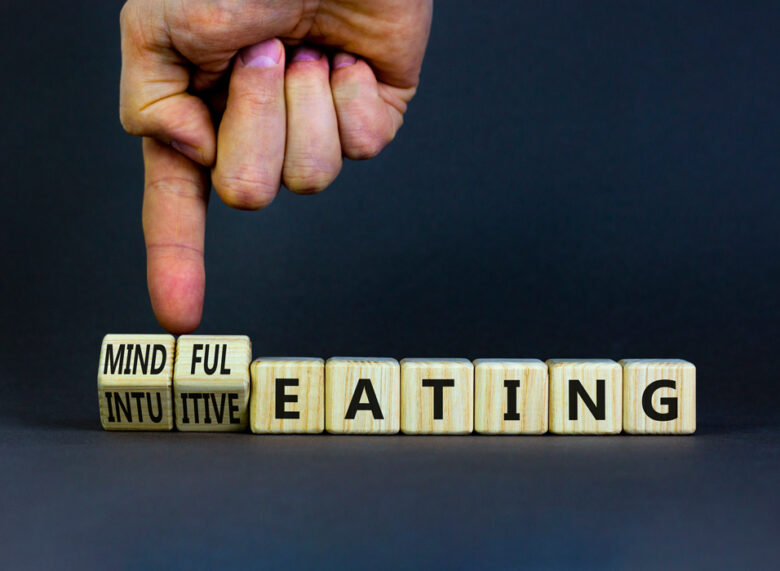Many clients report complicated or challenging relationships with food and with their body image. I am passionate about helping individuals overcome these challenges. During my graduate studies, I sought opportunities to work with clients who were reporting impulsivity around eating and other food- or body-image related behaviors that were causing them problems in living the lives they want. A number of things can contribute to patterns of binge eating. Sometimes a binge is an effort to manage intense emotions– in the moment of the binge, this can offer a distraction or a numbing of unpleasant emotions. Unfortunately, the emotions that follow a binge can be quite painful. It is also important to note that a binge is largely driven by a biological response to hunger cues that can occur as a result of restrictive eating.
When I was training in this area, it was not long before I began to see a trend, a term dubbed in the literature as the “binge-purge shame” cycle (or, sometimes it is clearer when I address this as the “binge-shame cycle”). This Binge Shame Cycle, which I will refer to as BSC, refers to a person’s pattern of restricting food intake, leading the body to a “starvation mode” and later ending up experiencing a binge (loss of control and eating much more food than one normally would in a sitting). Many individuals express frustration, sadness, and even shame after experiencing a binge. These emotions are important, and merit attention with a trusted therapist. That said, I think it’s essential to know that the binge response is actually a natural biological response to food restriction! When the body reaches starvation mode, your body reacts in a way to preserve your energy, unsure if it will get fed again soon. The urge to binge then comes from that natural desire of the body to fuel itself, and due to the earlier restriction, the food intake tends to be much more than a person plans for.
It is important to understand that the body is simply trying to meet its goal of feeling satiated. I often express to clients that it will be nearly impossible to eliminate binging behavior if they are actively restricting their food intake. This is important, because an important way to manage the the biological contributions of the body to the BSC may mean that you actually have to eat more often, and plan your meals ahead of time to prevent your body from reaching that starvation mode in the first place!
The following are some concrete tips for addressing several aspects of the binge-shame cycle.
- Notice your hunger cues! Consider keeping track of your hunger on a 1-10 scale, with 1 representing “extremely hungry” and 10 representing “extremely full.” The goal would be to keep your satiation level in the 4-7 range, and aim to keep yourself from reaching a level 1, which would be the “starvation mode.” By tracking your hunger over time, you may start to notice trends in your eating behavior. Perhaps there is a time of day that you are especially busy and end up missing a meal or snack for over 4 hours of time. You notice that when you finally get home from work you want to eat everything in sight, and barely remember tasting the food. This may be evidence that you need to plan ahead to bring a snack with you for that day, so you can fuel yourself on the go.
- Give yourself unconditional permission to eat different food items. This principle originates from the Intuitive Eating concept- seeing food as food, rather than “good” or “bad” food. Oftentimes, when someone doesn’t allow themselves to eat certain foods, when they finally do eat that food, they eat much more than necessary because the body is thinking
- If you find yourself experiencing binges or eating enough that you feel sick or uncomfortable, make a plan for yourself. Perhaps you know you are a 7 on the hunger scale (pretty full, feeling satisfied) but you also feel the urge to eat more despite the fact you are not hungry (maybe you’re bored, anxious, sad, etc). In this case, it is often helpful to keep an index card with a list of five things you will do before you decide if you should have more food. For example, some people drink a glass of water, go for a walk, clean and tidy up, call a friend on the phone, and after 30 minutes realize they are not hungry anymore. Other times, you might realize you actually are in fact still hungry, and that’s okay! Perhaps you didn’t have enough at dinner to fuel yourself and you would like to have another side. After fueling yourself a little more, consider going through your list of activities again. Having a go-to plan can be especially helpful to “get out of your head” and create a routine.
- Make time to learn what emotional variables may be triggering the urge to binge– when you binge, does it take you away from feelings of anxiety around a major life event? Therapists can help explore what may be going on emotionally that contributes to the binge cycle.
- To be clear, the BSC is often caused by much more than simply “eating too much.” Oftentimes we are struggling with something emotionally- perhaps your romantic relationship is feeling tense, work has been stressful, or your family has not been supportive of your needs. Generally eating behaviors have much less to do with food, and much more to do with what is going on emotionally. I can help you understand your behaviors, including the urge to binge, help you develop coping tools to combat the BSC, and also provide a space for you to explore the different emotional experiences that are coming up for you and that may be contributing to the urges to binge. I utilize evidence-based practice, including Cognitive Behavioral and Dialectical Behavioral Therapy to help you understand the impact of your thoughts on your emotions and behaviors, while also helping you develop skills to regulate your emotions, and feel better about your relationship with food.




